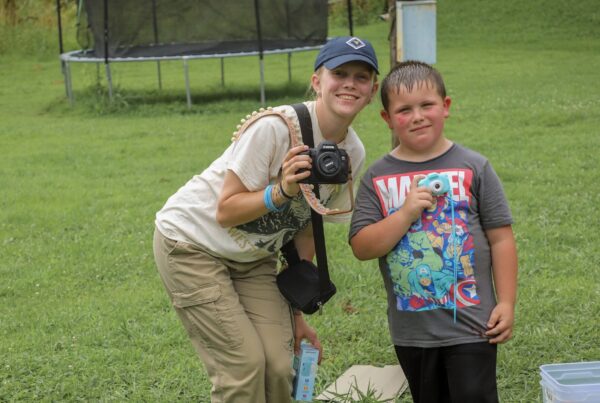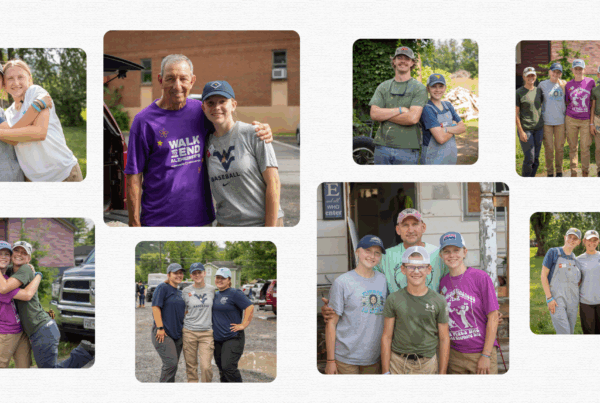Two months ago, when I drove to Jonesville, Virginia for Summer Staff Training, I found a lot of people who I had never met. They were excited, and nervous, for a summer of serving in Central Appalachia.
I was excited as well, especially about all the people I’d be meeting. So I began the blog series thinking about how a porch is a great place to meet new people. This week, the staffs have closed out their centers and returned to the Porch in Jonesville, Virginia for Wrap-Up. And it has me thinking about all the people I’ve met.
One thing this summer has taught me is the importance of meeting strangers. When we are willing to meet people, they stop being strangers. The more that happens, the more everyone gets along. But meeting strangers isn’t always as easy as it may seem. All sorts of things can get in the way, like nerves and prejudices and fear. It takes some work.
Looking back at those first two weeks, I remember being nervous too. I was looking ahead at two months of driving to counties I’d never visited and meeting a lot of new people. I didn’t know anyone there on the Porch, and it was a little intimidating to see how many of the staffers already knew each other. But I gradually began to feel less like a stranger and eventually eased into the groove of the summer.
During Summer Staff Training, one moment really helped ease my nerves. One of the Center Directors gave a devotion, and he read a story from Tex Evans’ book “Life is Like That.” Tex, the founder of ASP, had met a man named Brother Gentry, who whistled while he worked to let his wife know that he was there and he cared. To read the whole story, see the previous blog post “Ivy and the Blues.” Or, better yet, get a copy of the book and read it in Tex Evans’ own words. (While you’re at it, read “Grandpa’s Famous Bicycle Ride,” which tells the story of when his grandpa’s bike riding out-paced a thunderstorm.)
The CD told this story to remind us, when the summer gets to be difficult, to listen for the whistles coming from God who is there for us and cares. That’s been a helpful reminder for me throughout the summer. And easing those nerves has made room for meeting more and more people.
A Long Stretch of Road
A Tex Evans story helped us get the summer started, so I figured another one should help us with wrapping up. It just so happens that he chooses to conclude his book with a story about meeting a stranger. It’s called “¿A donde va?”
When he was eighteen, he decided to travel to California to look for work.
“I didn’t walk all the way, but I walked a whole lot more than I wanted to,” he tells. “The point is, I did not have very much money and I had to get to California in whatever manner I could.”
He slept under bridges, on train platforms, and in cheap hotels. One July day he was walking on a long, straight stretch of road, with no bends, through West Texas.
“I was without food, and I had not had a drink of water all day long, and I had walked on a straight stretch of road – all the live-long-day – and I was tired!” He says, “Being only eighteen years of age, and having something of a sociable nature, and being far from home, and moving toward the unknown, I was lonesome.”
Aren’t we all like that some days? Worn out. Worried about the unknown. Away from home. Lonely. This summer, staffers and volunteers haven’t seemed to face the problem of not having people around. But they do face those other things. It’s time away from home, full of tiring activities and the unknown.
Mary, a volunteer group leader from Our Lady of Good Counsel High School in Maryland, said that her week of volunteering was full of unknowns. She said she would say to an adult thinking of leading youth on an ASP trip, “First, I’d recognize, yeah, it’s a risk. Okay. Your stomach will jump. Your heart. You don’t know about the unknown, and that’s the scariest part. But you are one of seven. You have six other team leaders. You have six other people that you can ask questions, right?”
That’s the hope when we face the unknown, that we will have others with us. Mary said that the week had been a wonderful experience, and that the risks were worth it, especially because ASP aligns with their school’s goal of serving and living like Christ. But sometimes we are all alone, just like Tex was on that scorched road, with not even a bend in the road to look forward to.
But then, “About four o’clock in the afternoon when the sun was still shining burning hot, I reached the point in the road, on the top of a small hill, where the road actually turned. I still remember how relieved I was just to get a variety in the road. The road simply made a little turn to the left and continued on down the other side of the small hill. However, at this little turn in the road I had a delightful experience at the end of that hot, dry day.”
His delightful experience was meeting a stranger, originally from Mexico, who was the same age as him.
“He was as surprised to see me as I was to see him. Evidently he was by nature a friendly person, because I immediately sensed the friendship and the warmth and the interest which came from his face.”
Tex asked if he lived around here, but the boy gestured to his mouth to communicate that he didn’t speak English.
“Then,” Tex says, “I summoned my vast linguistic skills and I said to him, ‘¿Tiene usted agua?’ (‘Do you have any water?’). The boy’s face lit up like a flower. One could tell that he was delighted.”
Tex’s fellow eighteen year old did have water, and he said, “’¡Si en el guiyin!’ (‘Yes, in the wagon’).”
“Then, dropping the reins of his mule, he walked with me over to the wagon. We climbed in the wagon, and there was a barrel. Obviously it had water in it! He drew a burlap cover and handed me a dipper.”
They sat there, and Tex drank a lot of the boy’s water. He says that he felt so good he wanted to give him a hug.
He says, “I looked at him and could see friendship just pouring out of his face. I could think of nothing to say–stupid me! In a minute he said to me, ‘¿A donde va?’ (‘Where are you going?’). I replied, ‘¡A Los Angeles!’ He shook his head and looked at me and said, ‘Ah, mucho lejo’ (‘It is very far’).”
After that, they said goodbye and Tex continued on his way. About fifty yards down the road, he looked back. “He was still standing beside the mules and looking intently at me. When I looked at him he lifted his hand up above his head and, smiling, waved to me and called out, ‘¡Adios!’ Joy filled my heart!”
Sometimes I hope for incredible moments of change or goodness in my life. But what happened to eighteen years old Tex Evans was not incredible. It was merely friendly and delightful.
“Now, that took place almost fifty years ago, but I can see that boy’s face, I can hear his gentle voice, I can remember his obvious friendly spirit and good will as vividly today as I could the day after the episode. It has been one of the delightful memories of my life.”
He was on a long, hot road. He was thirsty and lonely. He meets a boy his age, who immediately emanates excitement to see him, like a spring that can’t help rushing over a pile of stones. He gives him water and asks about his journey. Meeting people in the middle of their lonely road doesn’t take much – maybe just a drink and a how-are-you? – but it does a lot. It eases loneliness and quenches thirst.
Friends From All Over
This summer, it has been delightful to meet all sorts of people and to see others meeting each other. One awesome thing about ASP is that it brings people together from all over the country. Volunteers from New York spend a week with staff from Illinois. Staff from Oregon spend a summer with homeowners in Virginia. They offer each other drinks of water and ask about the road they’re travelling.
Making friends out of strangers is one of the most meaningful things we can do in this world. It allows us to care for each other, and it works against the powers of hate. But it doesn’t just happen. It takes people who are willing to be welcoming to others, including strangers. That takes good listening and careful action. Providing for needs, like offering a dipper of water or repairing a home, connects people to each other.
In the words of Mary, “Be good, do good for others, and smile while you’re doing it. It makes all the difference.”
I hope we can continue learning how to share stories and drinks of water, whether that’s asking “A donde va?” or helping repair someone’s home. And maybe, when we’re fifty years down this long, hot road, what we’ll remember most are the strangers who became friends over cold drinks of water.
Isaac Wood
Story Gathering Intern




